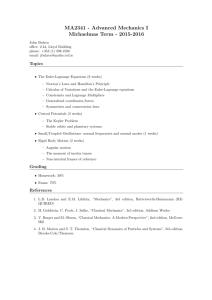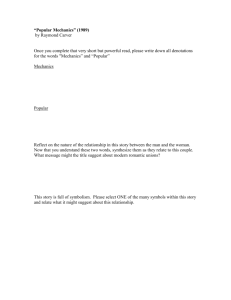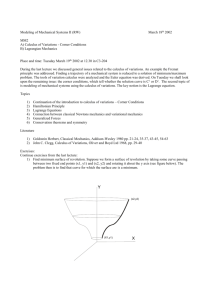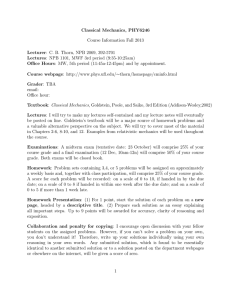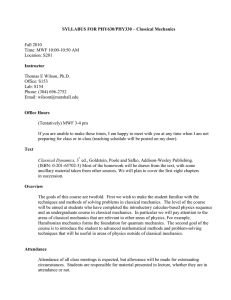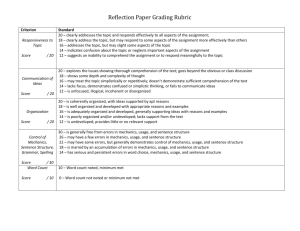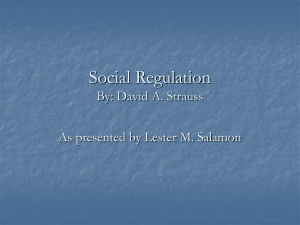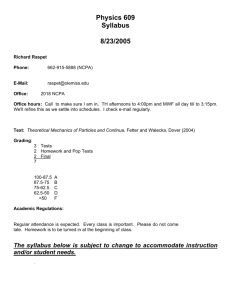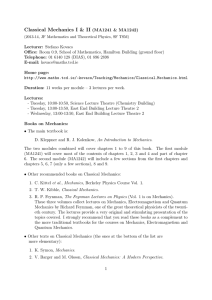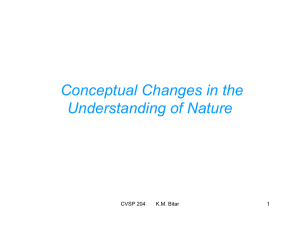Riyad N Bitar
advertisement
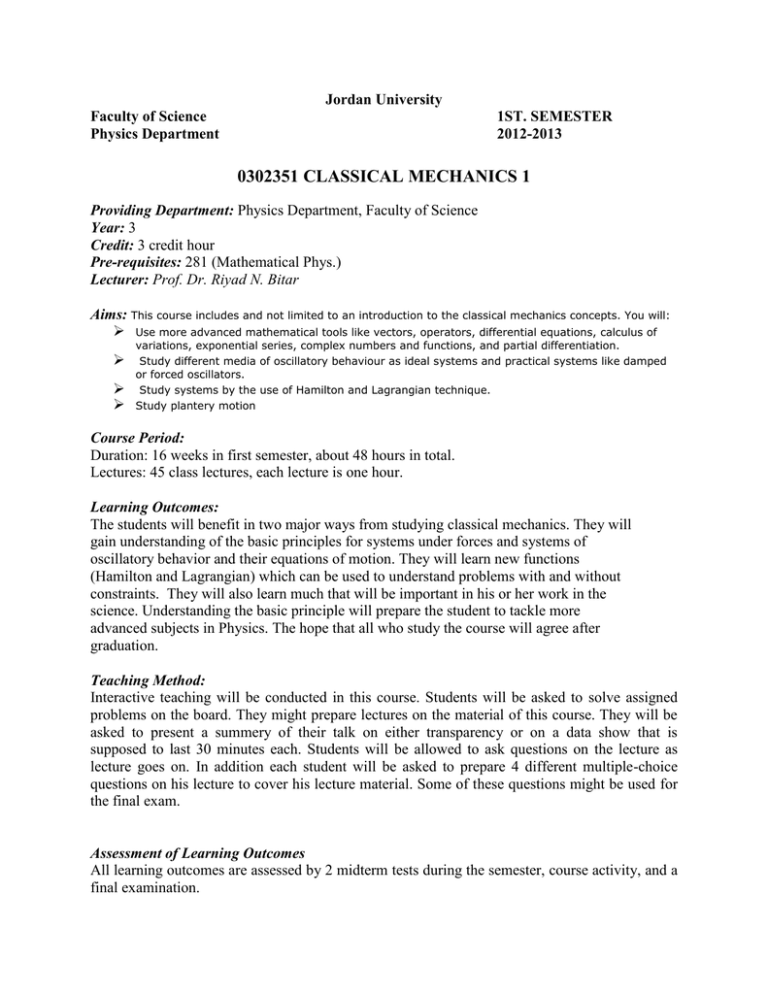
Jordan University Faculty of Science Physics Department 1ST. SEMESTER 2012-2013 0302351 CLASSICAL MECHANICS 1 Providing Department: Physics Department, Faculty of Science Year: 3 Credit: 3 credit hour Pre-requisites: 281 (Mathematical Phys.) Lecturer: Prof. Dr. Riyad N. Bitar Aims: This course includes and not limited to an introduction to the classical mechanics concepts. You will: Use more advanced mathematical tools like vectors, operators, differential equations, calculus of variations, exponential series, complex numbers and functions, and partial differentiation. Study different media of oscillatory behaviour as ideal systems and practical systems like damped or forced oscillators. Study systems by the use of Hamilton and Lagrangian technique. Study plantery motion Course Period: Duration: 16 weeks in first semester, about 48 hours in total. Lectures: 45 class lectures, each lecture is one hour. Learning Outcomes: The students will benefit in two major ways from studying classical mechanics. They will gain understanding of the basic principles for systems under forces and systems of oscillatory behavior and their equations of motion. They will learn new functions (Hamilton and Lagrangian) which can be used to understand problems with and without constraints. They will also learn much that will be important in his or her work in the science. Understanding the basic principle will prepare the student to tackle more advanced subjects in Physics. The hope that all who study the course will agree after graduation. Teaching Method: Interactive teaching will be conducted in this course. Students will be asked to solve assigned problems on the board. They might prepare lectures on the material of this course. They will be asked to present a summery of their talk on either transparency or on a data show that is supposed to last 30 minutes each. Students will be allowed to ask questions on the lecture as lecture goes on. In addition each student will be asked to prepare 4 different multiple-choice questions on his lecture to cover his lecture material. Some of these questions might be used for the final exam. Assessment of Learning Outcomes All learning outcomes are assessed by 2 midterm tests during the semester, course activity, and a final examination. Mode of Assessment: 1- Two one hour exams (20%); Course activity (10%); Final 2-hours examination (50%) Syllabus: Newtonian Mechanics Oscillations and Chaos. Gravitations. Calculus of Variations. Hamilton’s Principles. Planetary Motion Tentative Content of Course and Time Table: Chapters Week 1 2 Newtonian Mechanics. 2 3 4 5 3&4 Oscillations and Chaos. 7 8 5 Gravitations. 9 10 6 Calculus of Variations. 11 12 13 14 7 Hamilton’s Principles. 15 16 8 Planetary Motion Subject Attendance Policy: Lecture attendance is expected. The course notes and the textbook are comprehensive. You are responsible for the material covered in lectures. Expected Workload: On an average, you should expect to spend about 8 hours per week on this course. Important Dates: First term exam is expected to cover 1/3 of the material the second term exam is going to be on the next 1/3 of the material Final Exam: to be announced by the admission and registration office, please always check! Feedback: Concerns or complaints should be expressed in the first instance to the course lecturer. At the end of the course, the students will be asked to evaluate the content of the course, its teaching, the learning, and the lecturer. The monitoring of these students feedback will allows the course quality improvement. Textbook Classical Dynamics of Particles and Systems, Stephen T Thornton and Jerry B. Marion, 5th Ed. Thomson Books, 2004 Supporting Material: 1. Mechanics, Keith R. Symon, Addison-Wesley 2. Vibration and Waves, A. P. French, W. W. Norton & Company, 1971. 3. The Physics of Vibrations and Waves, H. J. Pain, Jone Wiley and Sons, 6th. Ed.2008. 4. Analytial Mechanics, Grant R. Fowles and George L. Cassiday Instructor: Name Office Number Office Phone E-mail Office hours Prof. Dr. Riyad N. Bitar 16 22044 riyadnb@ju.edu.jo Any time
